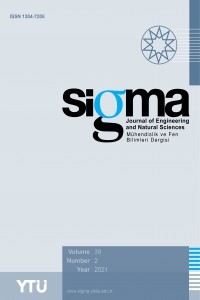Design and development of an upper extremity performance analysis system for combat sports
Performance, upper extremity kinetic, kinematic, sport,
___
- [1] Brukner, P., Clinical Sports Medicine: Injuries. 2017: McGraw-Hill Education (Australia) Pty Limited.
- [2] Ayan, V. and O. Mülazimoğlu, Sporda yetenek seçimi ve spora yönlendirmede 8-10 yaş grubu erkek çocuklarının fiziksel özelliklerinin ve bazı performans profillerinin incelenmesi (Ankara Örneği). FÜ Sağ. Bil. Tıp Derg, 2009. 23(3): p. 113-118.
- [3] Henriksen, K., et al., Athlete mental health in the Olympic/Paralympic quadrennium: a multi-societal consensus statement. International Journal of Sport and Exercise Psychology, 2020. 18(3): p. 391-408.
- [4] Rittweger, J., A. Kwiet, and D. Felsenberg, Physical performance in aging elite athletes-Challenging the limits of Physiology. Journal of Musculoskeletal and Neuronal Interactions, 2004. 4(2): p. 159.
- [5] Carson, H.J., D. Collins, and J. Richards, Initiating technical refinements in high-level golfers: Evidence for contradictory procedures. European Journal of Sport Science, 2016. 16(4): p. 473-482.
- [6] Vanrenterghem, J., et al., Training load monitoring in team sports: a novel framework separating physiological and biomechanical load-adaptation pathways. Sports Medicine, 2017. 47(11): p. 2135-2142.
- [7] Kamar, A., Sporda yetenek, beceri ve performans testleri. 2003: Nobel.
- [8] Özdemir Şahin, F. N., T. Altinok, and C. S. Aslan, Askeri Akademi Savaş Beden Eğitimi Programının Teknolojik İmkan ve Kaabiliyetler Açısından Analizi. Spormetre Beden Eğitimi ve Spor Bilimleri Dergisi, 2010. 8(4): p. 163-167.
- [9] Balsalobre-Fernández, C., et al., The validity and reliability of a novel app for the measurement of change of direction performance. Journal of Sports Sciences, 2019. 37(21): p. 2420-2424.
- [10] Wixted, A. J., et al., Measurement of energy expenditure in elite athletes using MEMS-based triaxial accelerometers. IEEE Sensors Journal, 2007. 7(4): p. 481-488.
- [11] Yeşilyurt, B., et al., Evaluation of the Potential of the Internet of Things in Health Services with Multi Criteria Decision-Making Methods. Sigma: Journal of Engineering & Natural Sciences/Mühendislik ve Fen Bilimleri Dergisi, 2020. 38(3).
- [12] Perš, J., et al., Observation and analysis of large-scale human motion. Human Movement Science, 2002. 21(2): p. 295-311.
- [13] Harbili, E. and S. Aritan, Elit Haltercilerde Koparma Tekniğinin Karşilaştirmali Biyomekanik Analizi. Spor Bilimleri Dergisi, 2005. 16(3): p. 124-134.
- [14] Caniberk, M., F. A. Sesli, and C. Çetin, Spor Biyomekaniğinde ve Üç Boyutlu Hareket Analizinde Sayısal Fotogrametrinin Kullanılması. Spor Hekimliği Dergisi, 2016. 51(4): p. 117-127.
- [15] Yamauchi, J. and K. Koyama, Toe flexor strength is not related to postural stability during static upright standing in healthy young individuals. Gait & posture, 2019. 73: p. 323-327.
- [16] Buśko, K., Biomechanical characteristics of amateur boxers. 2019.
- [17] Worsey, M. T., et al., Inertial sensors for performance analysis in combat sports: A systematic review. Sports, 2019. 7(1): p. 28.
- [18] Gharpure, C., et al., Cloud-based user interface augmentation. 2018, Google Patents.
- ISSN: 1304-7191
- Yayın Aralığı: Yılda 4 Sayı
- Yayıncı: Yıldız Teknik Üniversitesi
Ayşe ERGÜNER, Ramazan ÖZKAN, Kemal KOCA, Mustafa Serdar GENÇ
Uğur FIDAN, Mehmet YILDIZ, İsmail ÇALIKUŞU
Büşra Elif KAPLAN, Ali KARA, Hüseyin AKSEL EREN
Rami Reddy PADALA V, Kesava RAO V. V. S.
Fikret USTAOĞLU, Banu KUTLU, Yalçın TEPE, Handan AYDIN
Emre Cem ERASLAN, Deniz ALTUNTAS, Hayri BABA, Celal BAL, Hasan AKGÜL, Ilgaz AKATA, Mustafa SEVİNDİK
Nihal BAYRAMOĞLU, Mustafa Serdar GENÇ, Kemal KOCA, Ahmet ALTUNAL
Aslan GHOLAMI, Mohammad AMER, Majid ZANDI, Roghayeh GAVAGSAZ GHOACHANI
